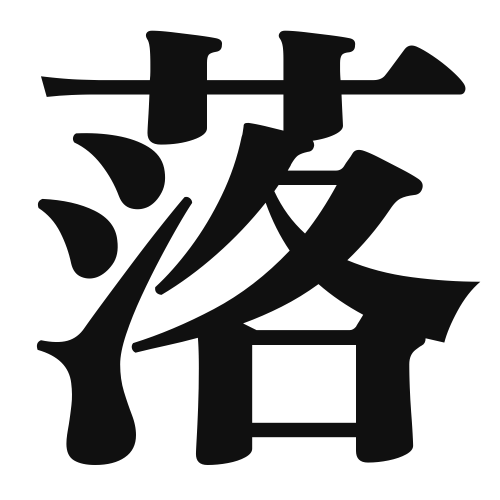1. Overview of Meaning
The kanji “落” (raku) primarily means “to fall” or “to drop.” It conveys the idea of something descending or being let go, often used in various contexts related to falling or dropping objects.
2. Formation and Radical
Formation of the Kanji: The kanji “落” is a phonetic-ideographic character (形声文字). It combines the semantic component “氵” (water) on the left, which suggests a connection to fluidity or movement, and the phonetic component “各” on the right, which provides the pronunciation.
Radical: The radical of “落” is “氵” (water), indicating its association with fluidity and movement.
3. Examples of Usage
Common Words and Phrases:
- 落ちる (ochiru) – to fall
- 落とす (otosu) – to drop
- 落ち着く (ochitsuku) – to calm down
Example Sentences in Daily Conversation:
- 「彼は階段から落ちた。」(Kare wa kaidan kara ochita.) – “He fell down the stairs.”
- 「ペンを落としました。」(Pen o otoshimashita.) – “I dropped my pen.”
4. Synonyms and Antonyms
Similar Kanji:
- 倒 (とう, tō) – to topple or fall over, often used for objects that are knocked down.
- 落下 (らっか, rakkā) – a noun meaning “fall” or “drop,” specifically referring to the act of falling.
Antonyms:
- 上昇 (じょうしょう, jōshō) – to rise or ascend, indicating movement upwards.
5. Cultural and Historical Background
Connection to Japanese Culture: The concept of “falling” is often associated with the changing seasons in Japan, particularly autumn when leaves fall. This imagery is prevalent in traditional poetry and art.
Proverbs and Idioms:
- 「落ち着いて考える」(Ochitsuite kangaeru) – “To think calmly,” emphasizing the importance of composure.
- 「落ちるところまで落ちる」(Ochiru tokoro made ochiru) – “To fall to the lowest point,” often used to describe hitting rock bottom before recovery.
